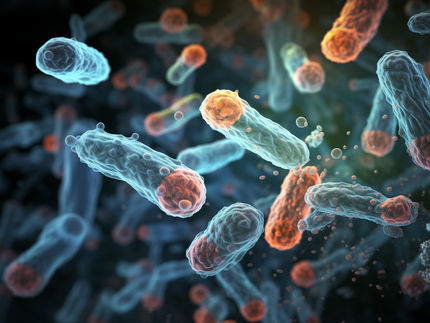Discovery of molecular switch for protein production
Scientists show how bacteria control their protein biosynthesis through cell metabolism – possible approach for developing novel therapies
Advertisement
protein biosynthesis – the process whereby cells produce protein molecules, which are essential for life and growth – is a highly complex and strictly regulated affair. An interdisciplinary team led by LMU biologist PD Dr. Jürgen Lassak has now discovered a previously unknown mechanism by which bacteria control this process. As the scientists report in the journal Nature Communications, a protein called EfpL functions as a controller that can ramp up or arrest protein production according to the metabolism of the cell.
Incorporating the amino acid building block proline into the nascent protein molecule presents a particular challenge for the cell during protein biosynthesis. Due to its rigid structure, proline frequently causes stalls at ribosomes – the “protein factories” of the cell. All organisms use a specific factor to overcome these stalls. In bacteria, this factor is called EF-P and helps ribosomes incorporate proline. As the researchers have now discovered, some bacteria possess an additional tool for protein biosynthesis – a protein called EfpL, which is closely related to EF-P. In contrast to EF-P, however, this protein reacts to the metabolism of the cell and adapts protein synthesis to the prevailing requirements through specific chemical modifications.
“EfpL offers us a unique opportunity to understand the flexible adaptation of bacterial protein production to environmental conditions,” explains Alina Sieber, lead author of the study. “This type of regulation was previously unknown,” adds Lassak, “and we’ve shown for the first time that the metabolism of the cell influences the activity of EfpL.” It is particularly interesting, he observes, that many human pathogens are found among the bacteria that use EfpL, including Salmonella species and Escherichia coli as well as the pathogens responsible for cholera and the plague.
The authors conjecture that the precise control of protein production by EfpL is an effective adaptation to changing habitats – such as when bacteria enter a human host. Consequently, inhibiting EfpL could offer a promising approach for suppressing the growth of such pathogens and thus developing novel therapeutic strategies.
Original publication
Alina Sieber, Marina Parr, Julian von Ehr, Karthikeyan Dhamotharan, Pavel Kielkowski, Tess Brewer, Anna Schäpers, Ralph Krafczyk, Fei Qi, Andreas Schlundt, Dmitrij Frishman, Jürgen Lassak; "EF-P and its paralog EfpL (YeiP) differentially control translation of proline-containing sequences"; Nature Communications, Volume 15, 2024-12-2





















































